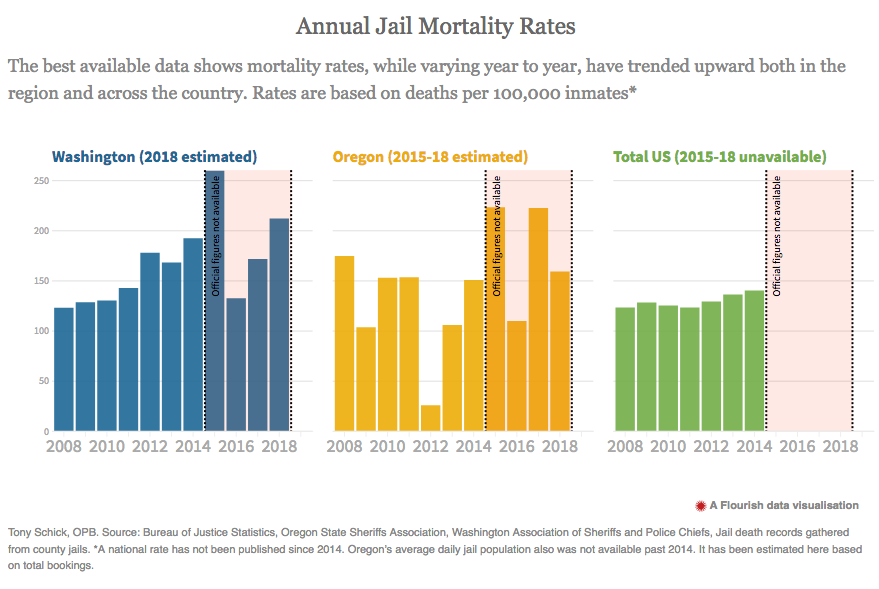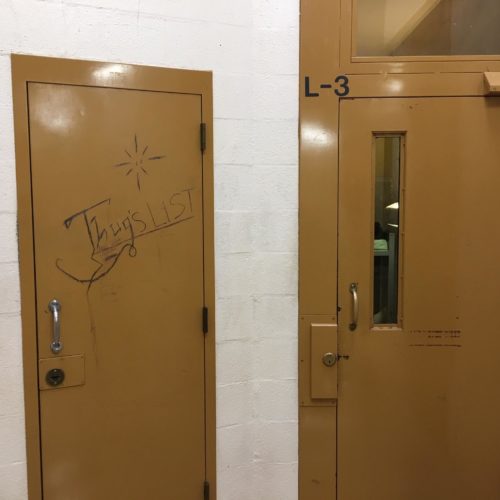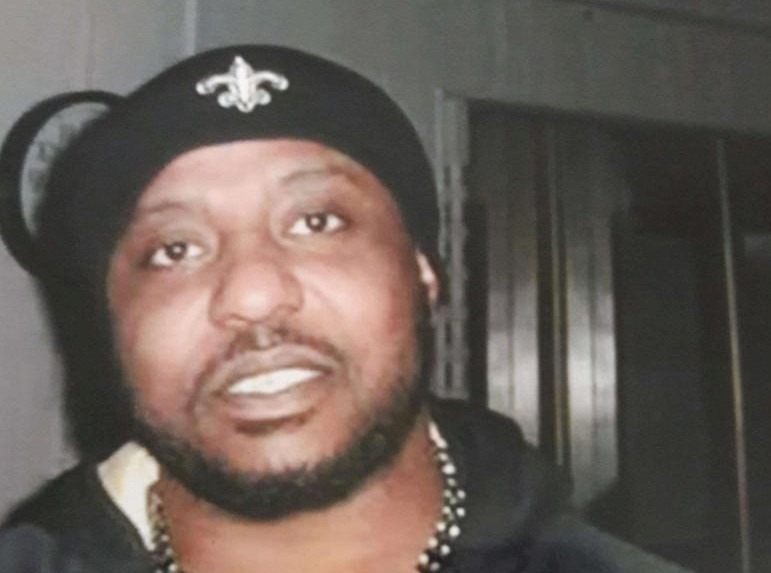
Booked And Buried: Case Of Lorenzo Hayes Shows It’s Not Easy Getting Answers To Jail Deaths
Listen
NOTE: This story is part of an ongoing investigative series by the public radio Northwest News Network and Oregon Public Broadcasting reporting on deaths in Washington and Oregon county jails. Read and listen to more in the series here.
Lorenzo Hayes, 37, was brought to the Spokane County Jail on the morning of May 13, 2015 for violating a domestic violence no contact order.
As officers escorted Hayes to a holding cell, there was a struggle. Jail staff took him to the ground and then placed him in a restraint chair. At some point, he stopped breathing.
Responding firefighters and paramedics performed CPR and got a heartbeat back, but Hayes later died at the hospital.
The medical examiner determined Hayes was experiencing methamphetamine toxicity and had aspirated on his own vomit while being restrained. The death was ruled a homicide, meaning it was caused “due to the acts of another.”
When someone dies in a county jail in Washington or Oregon, the county coroner or medical examiner has jurisdiction and conducts an investigation to determine the cause of death. Typically, there’s a concurrent law enforcement investigation.
In some cases, a detective from the local sheriff’s office investigates. Other times, the jail will look to a neighboring county or nearby city police to do the investigation. On occasion, the state police may take on the case.
“It’s kind of their determination of what their practice is,” said John McGrath, who directed the Spokane jail from 2009 to February 2019 and now serves as a jail services liaison for the Washington Association of Sheriffs and Police Chiefs.
In other words, jail deaths are a local matter. It’s up to the jail director, the sheriff or other county officials to decide how an in-custody death should be investigated. The state has no role and no oversight of that investigation. The result is jail death investigations have no guarantee of independence, oversight or necessarily accountability.

When McGrath ran the Spokane jail, he said the normal procedure after an inmate death was to notify the on-call homicide detective with the Spokane County Sheriff’s Office. Unlike in many Northwest counties, the Spokane sheriff does not operate the county jail.
In some cases, McGrath said, a multi-agency unit known as the Spokane Investigative Regional Response Team (SIRRT) would investigate. That’s what happened in Hayes’ case.
“Because there were questions whether or not he was in the jail’s custody at the time or still in the custody of the police department, it was an awkward situation to be in,” McGrath said.
The goal of calling in the SIRRT, McGrath said, was to have an open and transparent investigation. A detective with the Washington State Patrol headed up the investigation. The attorney who later represented the Hayes family, Nathan Roberts of the Connelly Law Offices in Tacoma, credited McGrath with bringing in that team, but said a truly independent investigation is one that doesn’t involve investigators who are part of that same law enforcement community.
In the end, despite the determination that Hayes died by homicide, there was no finding of any criminal culpability on the part of the officers involved. The family, however, filed a wrongful death lawsuit against the county on behalf of Hayes’ seven surviving children. They later settled for $500,000.
Ed Budge, a Seattle-based attorney who specializes in suing over jail deaths nationally, said the families he represents are often frustrated by a lack of information about what happened in the jail.
“A jail is very much a black box in that it is extremely difficult for family members to get answers to what led up to the loss of a loved one behind bars,” Budge said.
Budge added that, in his experience, comprehensive jail death investigations are the exception, not the norm.
“What I see too often is a failure by the agency to conduct the type of rigorous investigation that would be conducted if the death had happened in a place that wasn’t a jail,” Budge said.
The contrast is even starker, he said, when you consider the multiple federal investigations that were launched into death of billionaire financier and accused pedophile Jeffrey Epstein, who was found dead of apparent suicide in August at a New York federal jail.
“It’s like night and day, it’s apples and oranges,” Budge said. “I wish that the type of investigation that we see in the Jeffrey Epstein case would happen in many of the cases that I deal with, but unfortunately that’s just not the case.”
After Epstein’s death, according to The New York Times, jail staff were placed on leave, the jail’s warden temporarily reassigned and at least five investigations and reviews were launched. Additionally, U.S. Attorney General William Barr removed the acting director of the federal bureau of prisons. In November, two jail guards were charged with falsifying records. Both have pleaded not guilty.

Keaton Farris died in the Island County Jail on April 7, 2015. Courtesy of the Farris family
In Washington, after the 2015 dehydration death of Keaton Farris in the Island County Jail on Whidbey Island, the jail’s then-director was suspended, a lieutenant fired (she was later reinstated, but demoted in rank) and two frontline officers pleaded guilty to falsifying jail llog books. In addition, the jail installed new surveillance cameras, increased its healthcare staffing and instituted the “Keaton Farris Process,” a series of procedures governing how staff manage high-risk individuals like Farris.
But that case was unusual. Deaths in Northwest jails rarely result in swift personnel actions, trigger multiple investigations or lead to sweeping changes in how jails are managed.
The National Institute for Jail Operations – which accredits jails — recommends a three-pronged approach to investigating in-custody deaths. First, an investigation to determine if someone is criminally responsible for the death. Second, an inquiry to look at whether there were civil rights violations. And third, an administrative review to determine if jail policies or procedures were violated.
But it’s not clear how frequently, or infrequently, jails follow that best practice. Linda Bryant is a former deputy attorney general in Virginia who served briefly as an assistant superintendent of the Hampton Rhodes Jail, a large regional facility located in Portsmouth. Bryant has written about the importance of properly investigating inmate deaths and said, in her experience, jail death investigations often fail to identify systemic problems.
“You know, there’s a model for how to review death from a systems response,” Bryant said. “That’s what I felt was lacking, I still feel like it’s lacking frankly, from the jail world in general.”
Bryant said jails could benefit from adopting the model many states use to review child fatalities and domestic violence-related deaths with the goal of preventing future tragedies.
“If you’re going to lead a jail and you’re responsible for the care, custody and control of people, you need to be looking at the stuff to figure out how these deaths can be prevented,” she said.
Bryant also advocates for a state role in reviewing jail deaths. She noted Virginia law changed in 2017 to give the state Board of Corrections that authority.
In Texas, the state’s Commission on Jail Standards reviews in-custody death investigations with an eye toward identifying administrative rule violations, said Brandon Wood, the commission’s executive director.
Following the highly publicized death of Sandra Bland in the Waller County, Texas jail in 2015, the state Legislature passed the Sandra Bland Act which, among other things, requires an outside agency – like the Texas Rangers – to conduct any jail death investigation.
However, since the law passed, the number of jail deaths in Texas has increased, rather than decreased, according to recent reporting by the Palestine Herald, which noted that Texas is on track this year to have a record number of jail deaths. The newspaper also noted that the jails commission only has four investigators to inspect 250 county jails and has no authority to sanction jails that are out of compliance with state standards.
In Oregon, a set of statewide jail standards govern how jails should operate, including guidance on how notifications should occur in the event of an in-custody death. However, those standards do not specify how jails should conduct death investigations. On a bi-yearly basis, the Oregon Sheriff’s Association inspects jails to ensure compliance with the standards, according to executive director and former Marion County Sheriff Jason Myers.
Washington has no statewide jail standards and hasn’t since the 1980s. McGrath, the former jail director turned jails liaison, said there hasn’t been much talk of establishing state oversight of jails and that his current focus is on getting more jails accredited — which he views as a form of oversight.
During McGrath’s decade-long tenure at the Spokane jail, 24 inmates died from a range of causes including suicide, homicide and illness.
In an effort to reduce deaths in the jail, McGrath brought in a nationally-recognized jail suicide expert. He also had the National Institute of Corrections conduct two reviews of the jail’s policies and practices and make recommendations.
McGrath said he made a number of changes, including removing bed sheets which are commonly used by inmates to hang themselves. He also worked to improve the system of “cell checks” where staff regularly look in on individuals to make sure they’re OK.
But McGrath said the Spokane Jail, like a lot of jails around the Northwest, is outdated, overcrowded and understaffed — which can lead to dangerous conditions.
Given that local jails are in “dire need of help,” McGrath said he sees an opportunity for the state to re-invest in jails — something it hasn’t done since the 1980s — and along with that investment require more state oversight.
Related Stories:

He Died By Suicide In Solitary Confinement. Now Washington Will Pay $500K In Settlement
The state of Washington has agreed to pay $500,000 to settle a lawsuit brought by the family of a 29-year-old man who died by suicide in an isolation cell at the Airway Heights Corrections Center near Spokane in May 2014.

Booked And Buried: Jail Suicide Epidemic Doesn’t Extend To Northwest Prisons
Between 2008 and 2018, suicide accounted for 47% of jail deaths with a known cause in Oregon and Washington, according to an investigation by OPB, KUOW and the Northwest News Network. But an analysis shows the region’s prisons aren’t plagued by the same crisis.

Booked And Buried: Aging Northwest Jails Endanger Lives, But Replacing Them Is Controversial
Between 2008 and 2018, more than 300 people died after being taken to a county jail in Washington or Oregon, according to an investigation earlier this year by OPB, KUOW and the Northwest News Network. Nearly half died by suicide.
















